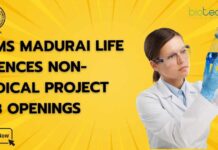ACTREC MTech Life Sciences JRF – BTech & MSc Attend Walk-In
ACTREC MTech Life Sciences JRF – BTech & MSc Attend Walk-In. MSc, BTech and MTech Life Sciences can attend a walk-interview for a Junior Research Fellow job. Interested and eligible applicants can check out all of the details on the same below –
If you are looking for some guidance on possible interview questions for the Junior Research Fellow role at ACTREC, then check the bottom of the page.
This job expires in
TATA MEMORIAL CENTRE
ADVANCED CENTRE FOR TREATMENT, RESEARCH AND EDUCATION IN CANCER
Kharghar, Navi Mumbai- 410 210
www.actrec.gov.in
Phone No : 91-22-27405000/5353/5082
(A Grant-in-aid Institution of the Dept. of Atomic Energy, Government of India)
No. ACTREC/Advt-77/2023
WALK-IN-INTERVIEW
for (PROJECT STAFF)
Project Title: “Metagenomics (mNGS) for the rapid identification of pathogenic organisms causing sepsis in adult patients of Acute Leukaemia (AL) including those undergoing bone marrow transplantation (BMT)”
Name of the Post – Junior Research Fellow
No. of Posts – 01
Duration – Six months
How to Apply –
Candidates fulfilling the requirements may walk in for interview on Wednesday, 05th July 2023 at Conference Room, 3rd Floor Khanolkar Shodhika, ACTREC, Kharghar, Navi Mumbai-410210
along with CV, original/ attested copies of all certificates and testimonials with ID Proof and recent passport size photograph.Reporting Time: 1.45pm to 2.15pm
Educational Qualification: Post Graduate Degree in Life Science or M.Tech/B. Tech/Masters in Computer Science or Life Science or Engineering or Biotechnology or Bioinformatics related subjects. CSIR-UGC NET and GATE-qualified students are preferred.
Experience: Six Months of experience in next-generation sequencing or bioinformatics is
mandatory.
Consolidated Salary: Rs.32,500/-p.m.(Rs.25,000+7,500/-HRA)
Check the notification below
Hey there, check out these possible interview questions for the role of Junior Research Fellow available at ACTREC
- Can you provide an overview of your educational background and the relevance of your degree to the position of Junior Research Fellow in the Metagenomics project?
- Answer: I hold a post-graduate degree in Life Science, which has equipped me with a strong foundation in biological sciences. Additionally, I have a background in Computer Science, which enhances my proficiency in data analysis and bioinformatics. This combination of disciplines allows me to contribute effectively to the interdisciplinary nature of the Metagenomics project, where advanced sequencing techniques and computational analysis play a crucial role in identifying pathogenic organisms causing sepsis.
- The project involves using metagenomics (mNGS) for the rapid identification of pathogenic organisms. Can you explain your familiarity with metagenomics and its applications in medical research?
- Answer: Metagenomics is a powerful approach that enables the study of microbial communities and their genetic material directly from environmental samples. In the context of medical research, metagenomics can be applied to identify pathogens causing infections, including sepsis. I have theoretical knowledge and practical experience in metagenomic sequencing techniques, including library preparation, sequencing data analysis, and interpretation of results. This expertise allows me to contribute to the rapid identification of pathogenic organisms in the Metagenomics project.
- The job requires experience in next-generation sequencing or bioinformatics. Can you elaborate on your hands-on experience in these areas and any specific tools or software you have utilized?
- Answer: I have gained six months of practical experience in next-generation sequencing techniques during my previous projects. I have worked with various sequencing platforms and performed library preparation, quality control, and data analysis steps. I am proficient in handling sequencing data and utilizing bioinformatics tools and software for data processing, alignment, and variant calling. I have hands-on experience with tools such as Bowtie, BWA, and SAMtools, which are commonly used in the analysis of sequencing data.
- As a Junior Research Fellow, you will be part of a team conducting research on sepsis in adult patients of Acute Leukaemia. Can you discuss any previous experience or exposure you have had to clinical research or working with patient samples?
- Answer: During my academic and research journey, I have actively participated in projects that involved clinical research and working with patient samples. I have collaborated with clinicians and obtained consent from patients to collect relevant biological samples. I have followed rigorous protocols for sample handling, processing, and storage to ensure data integrity. My experience with patient samples, coupled with my understanding of clinical research ethics, will enable me to contribute effectively to the Metagenomics project involving adult patients with Acute Leukaemia.
- The role requires working in a time-bound project. How do you manage your time and prioritize tasks to meet project deadlines effectively?
- Answer: I believe in effective time management and prioritization to ensure the timely completion of projects. I start by analyzing the project requirements and breaking them down into smaller tasks with specific deadlines. I create a detailed work plan and allocate sufficient time for each task based on its complexity and importance. Regular progress tracking and adapting the plan as necessary help me stay on track. I also maintain open communication with team members and supervisors to address any challenges promptly. By employing these strategies, I have consistently met project deadlines and delivered results efficiently.
Editor’s Note: ACTREC MTech Life Sciences JRF – BTech & MSc Attend Walk-In. Please ensure that you are subscribed to the Biotecnika Times Newsletter and our YouTube channel to be notified of the latest in the industry. Follow us on our social media like Twitter, Telegram, Facebook and Instagram.





































